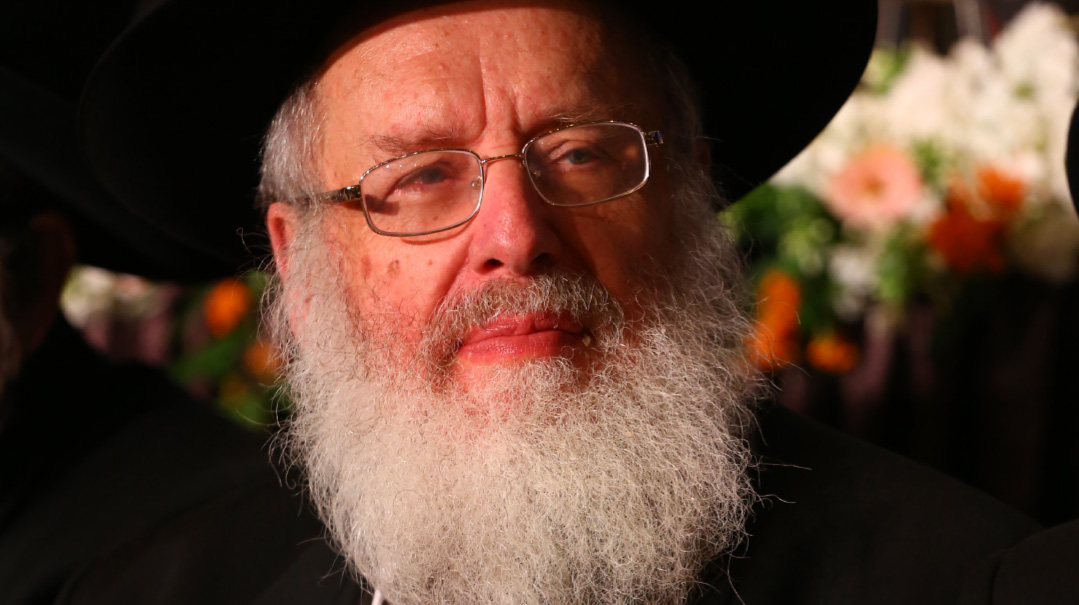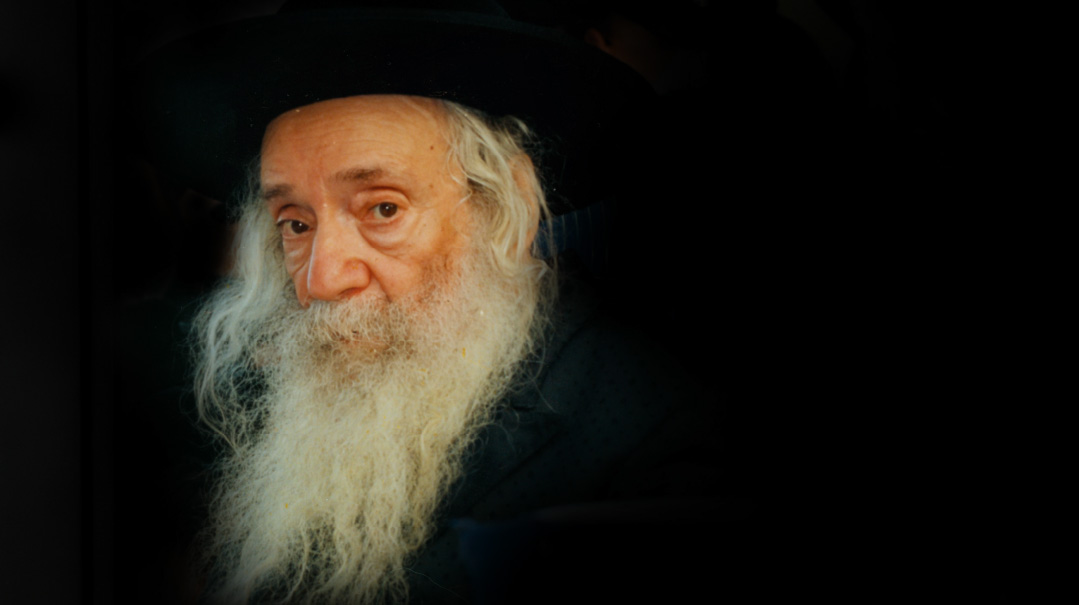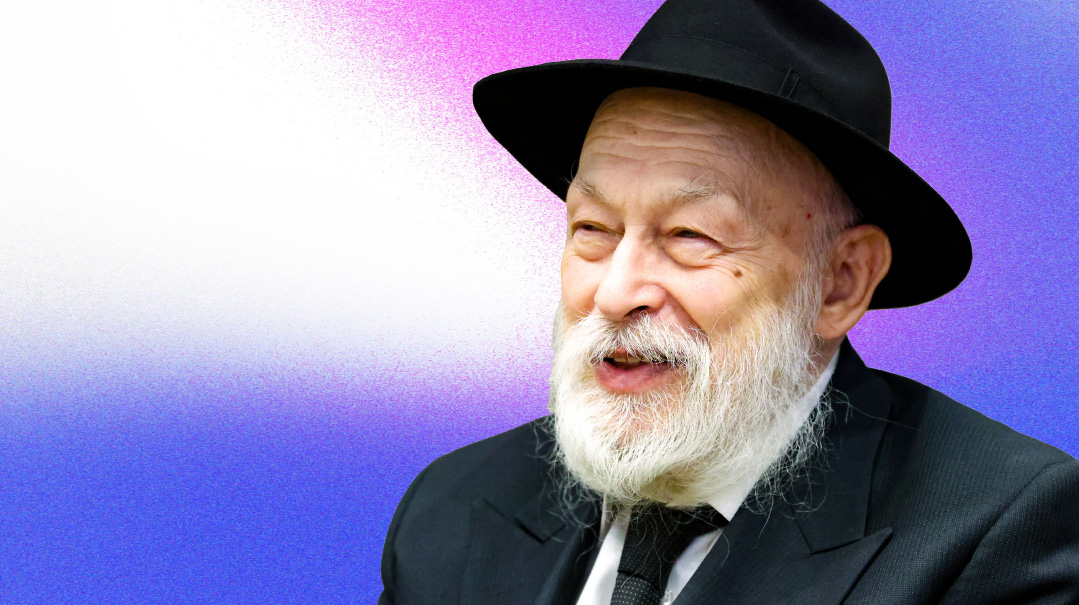Walking Mom — and Dad — Home

One woman’s account of her mother’s final years, and the complexities of when aging parents can no longer live alone
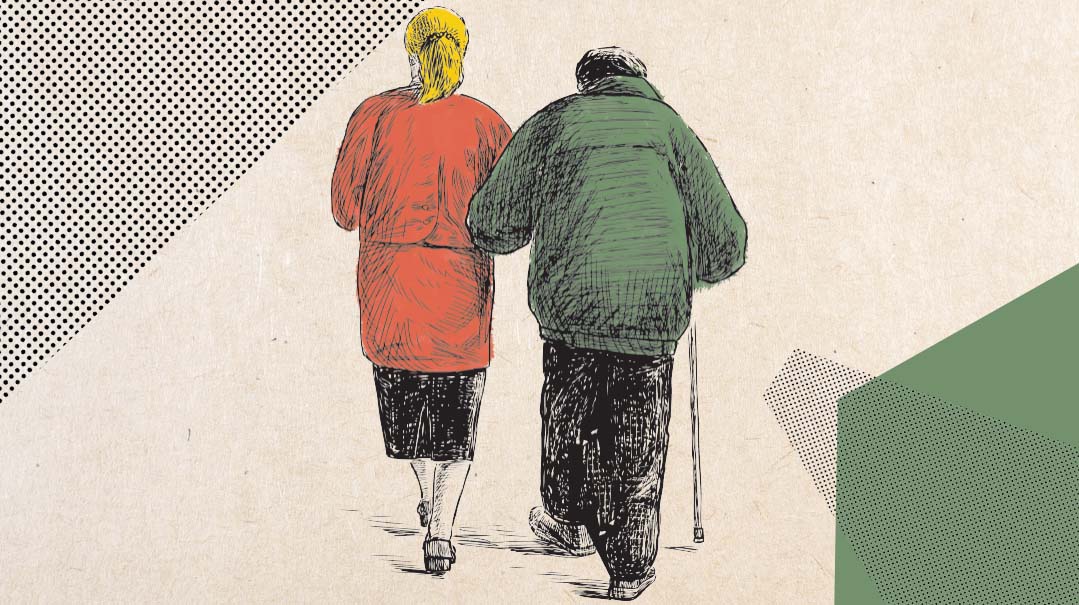
Afew years ago, the casual observer passing by Shifra Stein’s* house would have noticed two cars in the driveway, children’s bikes propped up near the garage, a stroller, and two wheelchairs — in other words, transportation for every age and stage.
Welcome to the world of the “sandwich generation,” in which middle-aged couples find themselves simultaneously raising young children, marrying off the oldest ones, and caring for declining parents. In the Orthodox world, says Harriet Blank, the director of OHEL geriatric services, our sandwiches are especially thick.
“They’re triple-decker,” she says. “It’s common to find parents in their eighties or nineties cared for by children in their sixties who have children and grandchildren they may also be helping.”
Jews have an old saying that a mother can take care of ten children, but ten children can’t take care of one mother. While caregiving was surely challenging in earlier times, today it’s all the more complex. Adult children find themselves navigating unknown medical territory, dealing with home care aides, and wading through a morass of insurance, legal, and government paperwork. They might be waking up with babies and then waking up for late-night parent emergencies.
It’s easy to get overwhelmed. Shifra Stein often felt that way as she did her best to take care of her own family while caring for her mother.
“Those were the most difficult years of my life,” she says. “People would mouth platitudes like, ‘You’re doing such holy work, you’ll have arichus yamim!’ or, ‘What a good lesson for your children!’ But sometimes, it didn’t feel wonderful at all. I was very often lonely and depressed. It’s only now that I see how we all grew from the experience.
“Caring for a sick parent is very emotional,” she continues. “It’s very painful to reverse the roles, to have the parent you always depended on depend on you. Sometimes you’re in the position of forcing your parent to do things he or she might not want to do. It can be a challenge to preserve your parents’ dignity when they’re incapacitated.”
After her mother was widowed, and seemed more frail and easily confused, Shifra convinced her to sell her house and move to an apartment a few miles closer. As she helped with the move and unpacked her mother’s affairs, she realized that her mother was showing signs of cognitive decline she’d never noticed before, or had simply attributed to post-operative confusion. Her mother wasn’t cooking much, and her once-spotless house was dusty and unkempt; there were cans of food in the cabinets without a hechsher.
“She once served me a piece of fish, and I saw it had mold on the edges,” she says. “When I pointed it out, she said, ‘In the shtetl that fish would have been a delicacy! Just cut it away!’ ”
Between the cognitive decline and other health issues, Shifra set about finding an aide for several hours a day, despite her mother’s initial resistance. It was, she says, a herculean effort. It took her close to eight months to organize everything for her mother to be covered under Medicaid. The paperwork was daunting, and when nurses arrived to interview the patient, often her mother would present herself as more functional than she really was. (“Yes, of course I cook for myself. Of course I’m on top of keeping my house clean.”)
Shifra went through a series of aides, some of whom lacked sensitivity. “That was painful and demoralizing,” she says. “You have to be careful to get someone who’s gentle and treats the patient with dignity.”
She finally found someone who not only attended to the physical needs, but maintained her mother’s dignity when her condition deteriorated. “We were in touch on a daily basis and supported each other in caring for my mom,” Shifra says.
Her mother began a slow decline of losing mental and physical function, with better and worse days.
“With dementia, you’re dealing with a constantly changing situation,” Shifra says. “I wasn’t always prepared. Each person’s decline is different, in a different way. Some people become placid, others aggressive. At the beginning, when they have more periods of clarity, you think maybe your parent will come back to you, but mostly it’s like losing them a little every day.”
Her own mother ran the gamut of symptoms, going through some periods of being completely nonverbal, and others of repeating the same five or six words.
Shifra considered herself lucky, since her friend Chani’s father became abusive, insulting her and bossing her around and making outrageous demands.
“It used to really hurt, because I had given up my job and my personal life just to take care of him,” Chani told her. “But after a while, I learned not to take it personally, to see it as the disease talking, not him.”
It’s terribly painful to watch someone you love deteriorate before your eyes. On top of that, caregivers suffer from a constant sense of inadequacy.
“You always feel like you’re never doing enough for your parent,” Shifra says. “Then everybody else — your kids, your friends, your family — want a piece of you too, and get upset when you’re not available. You feel like everyone will be mad at you, and that you can’t make anyone happy.”
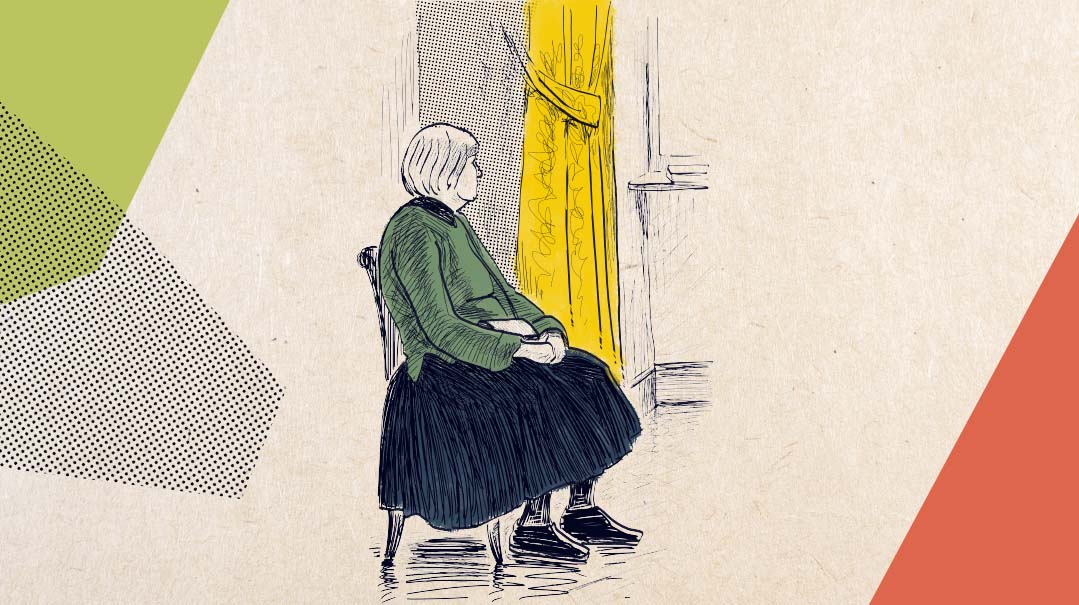
Family Support
In theory, children split up caring for a sick parent. In practice, however, some don’t live nearby, and others are dealing with demanding family or parnassah situations. One sibling typically becomes the point person.
“I got the job because I lived the closest,” Shifra says. “I’m also the oldest, and it’s usually the oldest child — or oldest daughter — who ends up being the caregiver.”
Her friend Chani, who is divorced, found that her siblings simply assumed she would become the caregiver for her father, because her children were grown and they still had larger, younger families at home. Chani stepped up to the plate, and while her siblings did pinch-hit when she needed time off to take care of other things, it sometimes bothered her that she was the one shouldering the lion’s share of the job. Caregiving is a huge burden, and no one seemed to realize how hard she was working or how much stress it added to her life.
All the practical nitty-gritty of parents’ care — medical help, money management, health care proxies, advance directives, and elder care law — can become “minefields” for siblings, says Mrs. Blank of OHEL.
“All sorts of old sibling rivalries can come to the surface when siblings have to divide responsibilities and make decisions under pressure,” Mrs. Blank comments. “Siblings can be far away and united, or close but disunited.”
Given these circumstances, it’s helpful if directives are put in place before emergencies arise, and the siblings agree on a rav for sh’eilos. In the end, Shifra says, her siblings were grateful for what she did, although, like Chani, she’s not sure they’re able to appreciate the full extent of the hours and anguish she put in as she ran from one medical crisis to the next.
Leah Horowitz of Chayim Aruchim, which advocates for the rights of critical patients, advises, “Once you accept the caregiver role, don’t look over your shoulder at what your siblings are or aren’t doing. The non-caregiving siblings should never criticize the one who’s doing all the hands-on care. They should never walk in and say, ‘Why does Mom look so bad?’ They should express appreciation and support for the hands-on caregiver.”
At one point, when a sibling challenged a decision Shifra had made, she thrust a huge file of paperwork toward him.
“Do you want to take over?” she challenged. “Be my guest!”
He backed down.
Shifra’s friend Chani would get frustrated when her siblings, hoping to make their father happy, would do things that undermined his health.
“I’d be so careful to feed him a low-salt diet with vegetables and lean meats,” she says. “Then my out-of-town brother would show up with a big bag of greasy, salty Chinese takeout! It would make my father’s face light up, in a way that hurt because I never felt appreciated like that. It would frustrate me terribly. And what do you do — tell your father he can’t eat it, or allow him a few last risky pleasures?”
When Shifra was faced with big health decisions for her mother, she used email or initiated conference calls with her siblings. She didn’t want to be blamed for making decisions the others would be unhappy with, nor was she comfortable taking that responsibility. When the decisions were especially tough, they consulted a rav.
Home Front Support
Shifra insists she would never have been able to take care of her mother and father-in-law without the complete support of her husband, who never complained about the demands on her time, energy, and emotions. Even her children were on board; instead of resenting her time devoted to their grandparents, they helped out.
“They didn’t suffer too badly, but they did make sacrifices,” she says. “Each one of my children had a relationship with my mother when she was still functioning, and they understood the situation. The caregiving helped us all bond.”
The services of her aide are also essential. Shifra describes it like a shidduch.
“It’s a mazel,” she says.
Their aide, Blanca, became close like a family member; when Shifra’s mother died, she cried bitter tears. Blanca was so devoted that she put a timer on her phone to make sure she turned her patient in bed every few hours, day and night, to heal her bedsores, an accomplishment that’s rare for aides to achieve with patients.
“I have no doubt that Blanca helped lengthen my mother’s life,” Shifra says. “She was with us 24/7, even during Covid, even though she herself was terrified of Covid.”
Despite the support of her husband, children, and the aide on this journey, Shifra suffered because of the lack of dialogue with others who understood her situation.
“Caregivers feel like what they do is never enough, that they’re inadequate to help,” says Jed Levine, the CEO of CaringKind, an Alzheimers support organization. “The sense of helplessness and hopelessness can create serious depression.”
Shifra joined an OHEL support group for caregivers, and found it helpful. “I felt there was a silence about what caregivers go through. Today, it’s rare for people to die suddenly, and the decline is a long, lonely time for the caregiver,” she explains.
In the support group, she was able to express her sadness, her anger, her frustrations and questions among others who shared her pain and passed no judgment. Others understood the sense of loneliness and being overwhelmed when they almost singlehandedly had to fight a constant battle on multiple fronts, assembling armies of medical specialists, legal and financial advisors, halachic advisors, and medical suppliers for everything from hospital beds to feeding tubes to pressure bandages.
“As the caregiver, you’re the person assembling all the various parts, and no one can replace you, because you’re the one at the center overseeing it all,” Shifra says.
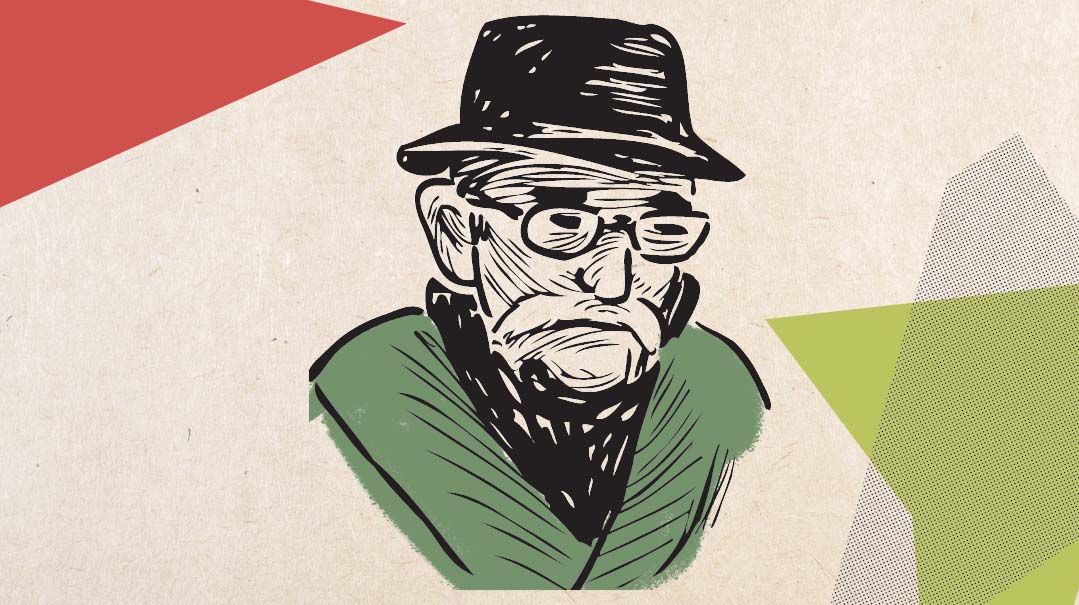
Struggling Toward a New Normal
After her mother’s petirah, Shifra still felt she couldn’t shake off the constant sense of responsibility.
“I had been on a hamster wheel for so long, constantly running and running without getting anywhere,” she says. “I had barely stabilized my life when a cousin got sick, and then I was running off to hospitals again.”
She still finds herself plagued by doubts and self-recrimination: She wonders if she caused her mother pain while caring for her. Perhaps she didn’t always have enough patience, or was too forceful trying to encourage her mother to eat or fight back against the progression of the illness.
“My mother was prescribed pills for pain at one point, and I realized she sometimes took extra ones behind my back,” Shifra says. “So I began controlling her intake, but I still wonder if I was right to do it.
“When we all asked mechilah of my mother at her kever, I really meant it. I was so worried I’d caused her tzaar.”
Shifra advises ironing out any personal issues with your parents before it’s too late.
“There was one point, back when my father was sick, that we fought about something,” she recalls. “The next day we made up, and everything calmed down. That evening, he had a massive heart attack, and died three days later. I am so grateful we didn’t part on bad terms.”
Now she does her best to remember the good. Even during the years of her mother’s illness, life wasn’t always bad; until the final stages, there were moments when her mother was clear enough to share in family simchahs, and enjoy her nachas. During the shivah, Shifra left out photos of her mother from the years when she was healthy, to show people who hadn’t known her then what a vibrant, intelligent woman her mother had once been.
“After 120 years, that’s the mother I expect to meet again,” Shifra says.
Legal Issues
Boruch Greenwald, Hillel Weiss, and Shimi Meyer of Greenwald Weiss Attorneys at Law specialize in estate planning in New York and New Jersey. Like Mrs. Horowitz, Mr. Greenwald urges people to have a properly crafted and legally enforceable health care proxy and power of attorney, even if you are relatively young and not ready to invest in full-scale estate planning.
“If someone is incapacitated, chas v’shalom, having those documents can significantly lighten the family’s burden,” he says.
End-of-life care is prohibitively expensive. Therefore, many people look to position themselves to be eligible for Medicaid benefits should they require a home aide or nursing home care. Medicaid eligibility has specific guidelines regarding asset ownership and income.
If you own your home and use it as your personal residence, you can still be eligible for Medicaid (subject to a maximum equity in the home). However, if you are forced to leave your home and enter a nursing home, Medicaid will force you to put your house up for sale — and then use the funds to pay for your care once the house is sold.
Another downside of leaving the home in your name is that Medicaid has a right to recover after death against the estate for reimbursement of the funds expended by Medicaid. Mr. Weiss says that it is important to consult with an estate planning attorney prior to transferring a home in preparation of becoming Medicaid eligible. A misstep using the do-it-yourself approach could produce undesirable consequences. If a trust is implemented, Mr. Mayer notes that care must be taken to ensure advantageous income tax treatment upon the sale of trust owned property.
Recently, many healthy seniors began leaving New York to live closer to children in Lakewood (or elsewhere in New Jersey). Mr. Greenwald advises that such individuals carefully review their estate plans, especially with respect to Medicaid planning, as the Medicaid rules vary significantly between the states. For example, while in New York there is a five-year lookback and penalty for any gifts made during this time, this only applies to Medicaid’s nursing home program.
For Community Medicaid (the program that pays for in-home aides, among other services), the lookback is only 30 months, and will only begin to be implemented in January 2022 (as of now). In New Jersey, however, the five-year lookback applies to all forms of Medicaid benefits. Other differences involve the treatment of retirement assets, the treatment of excess income, and the amount of hours Medicaid will actually provide for in-home aides. There are certain strategies that can be implemented in the eleventh hour, but advanced planning is certainly most prudent.
When Mommy or Tatty Can’t Live at Home — or with You
When it comes to choosing a residential care facility for a family member, says Moishe of Grandell Nursing Home and Rehabilitation Center, “There’s no one size fits all.”
Patients come in for a variety of reasons; different families have different priorities. Some patients come straight from a hospital, either for long-term care or rehab; others were living at home or with family, but it just wasn’t possible to continue.
Moishe suggests that families do their research. Speak to people who have had experience with the facility.
“Our best advertising comes from people who were happy with our care,” he says.
Online reviews and social media will offer opinions, although any facility will get at least one or two cranky reviews. Best of all, try to go on a tour. (Moishe did a few virtual ones during Covid.) Observe if the facility seems clean and well-maintained, smells good, has staff who seem cheerful and compassionate. Even if a patient is just coming for rehab, make sure there’s a good therapy program in place, entertainment for residents, and good nutrition (including special attention to needs such as diabetes or allergies).
“You want to be able to detach from time to time from the situation while feeling confident your loved one is being well cared for,” Moishe says.
Obviously, the patient’s medical situation will dictate what type of facility best suits his needs. Some facilities specialize in respiratory care. Some are equipped to provide dialysis, a big plus for renal patients, because it means not having to be transported elsewhere several times a week (which can lead to fatigue, missed meals, and other problems). Grandell has a designated memory care unit for dementia patients, with a staff specially trained in handling their care using memory boards and other techniques.
It’s important to have good relationships with the staff; try to obtain the cell number of at least one person on staff in case something comes up and you can’t reach the nurses’ desk or front desk. Even in the best facilities, family members need to provide input and remain vigilant.
“This is true when patients are alert, and even more so when they’re not,” Moishe says. “The family has to let the staff know if a patient can’t have salt, or is on blood thinners, or can’t turn on his own.”
Working as a team with caregivers goes a long way toward making the patient and everyone else as comfortable as possible.
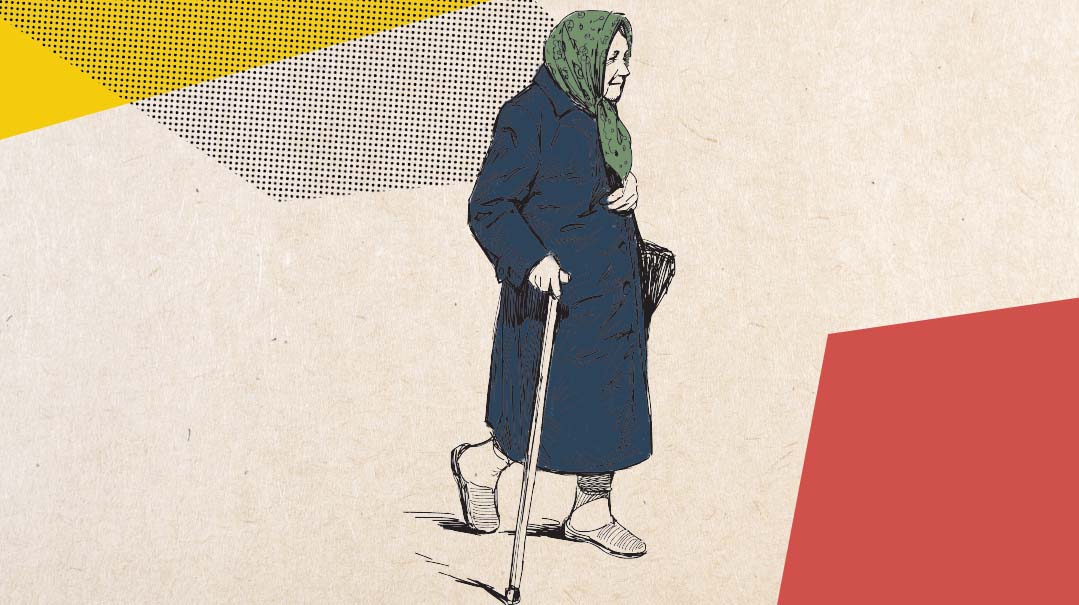
End-of-Life Tightrope
Mrs. Leah Horowitz, Chayim Aruchim’s discharge consultant, spends her days helping families with end-of-life issues. She can’t emphasize enough the importance of proper planning.
“A halachic living will is extremely important,” she says. “Even if you expect that decisions will be made by the next of kin, it’s very important to include a clause that says end-of-life decisions cannot be made without consulting a designated rabbi.”
She explains that this is vital when families go to court to advocate for patients who have been designated brain-dead — hence, considered dead by the state but not according to halachah.
“From the hospital’s perspective, keeping such patients alive is a waste of valuable resources,” she says. “The only leg we have to stand on [to continue giving care] is religious accommodation, which is a Constitutional right.”
Siblings, regardless of their religious affiliation, should decide in advance how best to respect what their parents would have wanted. When sh’eilos arise, it’s crucial to consult with a rav who’s well versed in medicine as well as halachah. Emotions run high during a crisis, and to avoid any confusion on the facts, it’s best if the rav speaks directly to the doctors.
“Most situations aren’t black and white,” Mrs. Horowitz says. “When it comes to decisions like whether or not to intubate, there’s no one size fits all.”
Many end-of-life patients spend their final days in hospice, but Mrs. Horowitz warns that family members should make sure to choose a halachah-respecting hospice. By definition, hospice means that the patient’s primary diagnosis — Alzheimer’s, cancer — is no longer being treated. But this should not mean that other secondary issues go without being treated: infections, dehydration, nutrition, bedsores. Hospice should make patients as comfortable as possible in their decline — not speed up the process.’
Support for the Caregivers
Some say the most frequently prescribed medication for elderly patients with degenerative diseases is Valium… for the children. Formerly easygoing parents may be transformed by pain, frustration, and ill health into irritable or demanding patients, or slip into a twilight state where they no longer recognize their family.
Jed Levine, president and CEO of CaringKind (the New York City chapter of the Alzheimer’s Association), said in a speech to Nefesh that children go through anticipatory grief as they watch their beloved parents slip away in body and mind.
“Caregivers feel like what they do is never enough, that they’re inadequate to help,” he says. “The sense of helplessness and hopelessness can create serious depression.”
This is why it’s immensely helpful for caregivers to join a support group.
“Many elderly people enter nursing homes not because they must, but because their care has become too overwhelming for the caregiver and her family,” says Harriet Blank of OHEL. “But when you care for a sick parent, it’s like being in a plane when the emergency light comes on. You absolutely have to put on your own oxygen mask first, or you won’t be able to help anybody.”
Sara Kohn, the director of hospital and physician relations at the Jewish Home for Rehabilitation (Marquis Health Services), runs monthly Alzheimer support groups jointly with Zicharon, a support organization for Alzheimer families.
“It’s especially useful around the Yamim Tovim,” she says. “Dementia patients are like young children in many ways — they’re very disturbed by changes in schedule. Holidays and simchahs, with lots of extra people in the home and crazy schedules, are particularly tough for them.”
Mrs. Kohn’s facility offers a respite program for caregivers who need to go away for a simchah or short break.
“They know it will be more disruptive and stressful for the patient than enjoyable, and here we have a 30-bed unit with a full staff,” she says.
When the patient is at home, other options exist to ease the daily burden, such as sending higher-functioning patients to adult day care, hiring more help, or providing a shiur or learning for a housebound man. Friends and family can be enlisted to sit with a parent from time to time, and grandchildren are a great resource.
“Get out, get some exercise, go to a shiur, laugh with some friends,” Mrs. Blank advises. “Don’t isolate yourself socially.”
As Rabbi Paysach Krohn said in a shiur on caregiving, be SAFE — an acronym to remind you to get support, alone time, food, and exercise.
(Originally featured in Mishpacha, Issue 882)
Oops! We could not locate your form.


